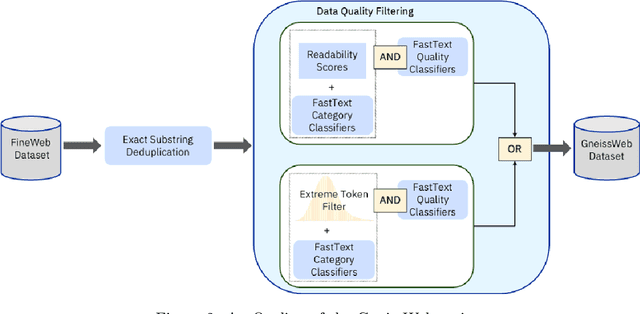Boris Lublinsky
GneissWeb: Preparing High Quality Data for LLMs at Scale
Feb 19, 2025



Abstract:Data quantity and quality play a vital role in determining the performance of Large Language Models (LLMs). High-quality data, in particular, can significantly boost the LLM's ability to generalize on a wide range of downstream tasks. Large pre-training datasets for leading LLMs remain inaccessible to the public, whereas many open datasets are small in size (less than 5 trillion tokens), limiting their suitability for training large models. In this paper, we introduce GneissWeb, a large dataset yielding around 10 trillion tokens that caters to the data quality and quantity requirements of training LLMs. Our GneissWeb recipe that produced the dataset consists of sharded exact sub-string deduplication and a judiciously constructed ensemble of quality filters. GneissWeb achieves a favorable trade-off between data quality and quantity, producing models that outperform models trained on state-of-the-art open large datasets (5+ trillion tokens). We show that models trained using GneissWeb dataset outperform those trained on FineWeb-V1.1.0 by 2.73 percentage points in terms of average score computed on a set of 11 commonly used benchmarks (both zero-shot and few-shot) for pre-training dataset evaluation. When the evaluation set is extended to 20 benchmarks (both zero-shot and few-shot), models trained using GneissWeb still achieve a 1.75 percentage points advantage over those trained on FineWeb-V1.1.0.
Data-Prep-Kit: getting your data ready for LLM application development
Sep 26, 2024



Abstract:Data preparation is the first and a very important step towards any Large Language Model (LLM) development. This paper introduces an easy-to-use, extensible, and scale-flexible open-source data preparation toolkit called Data Prep Kit (DPK). DPK is architected and designed to enable users to scale their data preparation to their needs. With DPK they can prepare data on a local machine or effortlessly scale to run on a cluster with thousands of CPU Cores. DPK comes with a highly scalable, yet extensible set of modules that transform natural language and code data. If the user needs additional transforms, they can be easily developed using extensive DPK support for transform creation. These modules can be used independently or pipelined to perform a series of operations. In this paper, we describe DPK architecture and show its performance from a small scale to a very large number of CPUs. The modules from DPK have been used for the preparation of Granite Models [1] [2]. We believe DPK is a valuable contribution to the AI community to easily prepare data to enhance the performance of their LLM models or to fine-tune models with Retrieval-Augmented Generation (RAG).
Granite Code Models: A Family of Open Foundation Models for Code Intelligence
May 07, 2024



Abstract:Large Language Models (LLMs) trained on code are revolutionizing the software development process. Increasingly, code LLMs are being integrated into software development environments to improve the productivity of human programmers, and LLM-based agents are beginning to show promise for handling complex tasks autonomously. Realizing the full potential of code LLMs requires a wide range of capabilities, including code generation, fixing bugs, explaining and documenting code, maintaining repositories, and more. In this work, we introduce the Granite series of decoder-only code models for code generative tasks, trained with code written in 116 programming languages. The Granite Code models family consists of models ranging in size from 3 to 34 billion parameters, suitable for applications ranging from complex application modernization tasks to on-device memory-constrained use cases. Evaluation on a comprehensive set of tasks demonstrates that Granite Code models consistently reaches state-of-the-art performance among available open-source code LLMs. The Granite Code model family was optimized for enterprise software development workflows and performs well across a range of coding tasks (e.g. code generation, fixing and explanation), making it a versatile all around code model. We release all our Granite Code models under an Apache 2.0 license for both research and commercial use.
 Add to Chrome
Add to Chrome Add to Firefox
Add to Firefox Add to Edge
Add to Edge